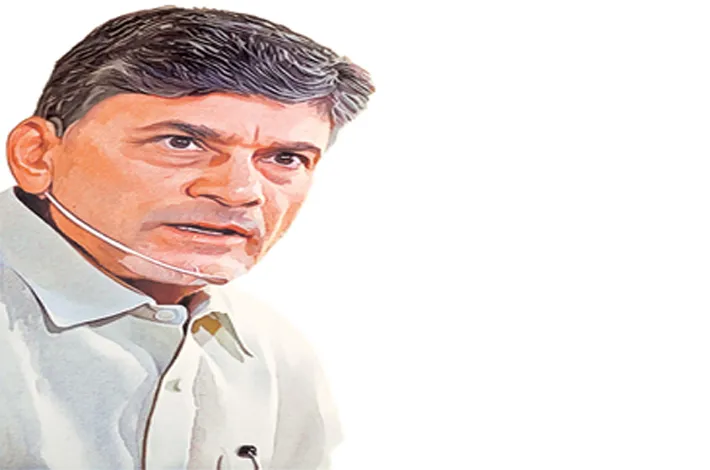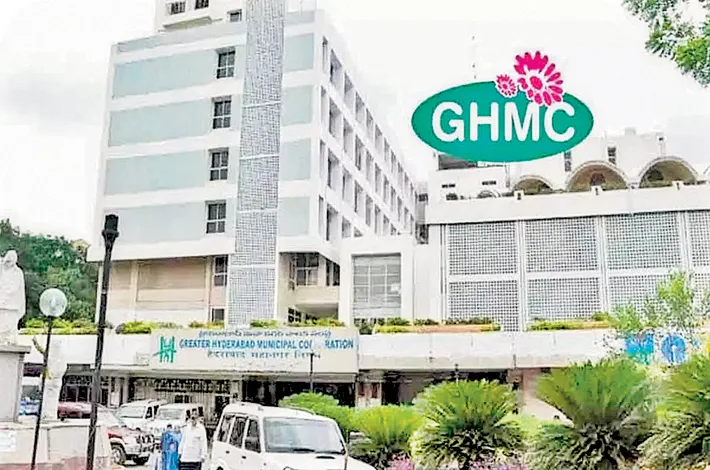CM Naidu’s twin vision
31-05-2025 12:00:00 AM

Telugu unity and strategic alliance in the South
Telangana Calling
Naidu’s pro-Telangana remarks at Mahanadu 2025 are not merely nostalgic but part of a broader strategy to reposition TDP as a unifying force for Telugu-speaking regions
■ Telangana and Andhra Pradesh, likening them to his “two eyes.”
■ Naidu’s recent remarks suggest a shift toward re-engaging Telangana’s electorate, possibly leveraging the party’s cadre in 30–35 constituencies to rebuild its base.
■ His emphasis on shared prosperity and non-opposition to Telangana’s irrigation projects aims to neutralize BRS’s regional rhetoric
■ TDP’s revival in Telangana hinges on overcoming its post-bifurcation baggage and navigating KCR’s ability to stoke regional sentiment
V J M DIVAKAR I hyderabad
At the Telugu Desam Party’s (TDP) Mahanadu 2025 event, Andhra Pradesh Chief Minister and TDP supremo N. Chandrababu Naidu made significant remarks emphasizing the equal importance of Telangana and Andhra Pradesh, likening them to his “two eyes.” These statements, coupled with his reflections on developing Hyderabad into a global IT and pharmaceutical hub during his tenure as Chief Minister of undivided Andhra Pradesh, signal a strategic outreach to Telangana’s populace.
Naidu’s comments, alongside calls from some Mahanadu speakers to revitalize TDP’s presence in Telangana, suggest a calculated effort to rekindle the party’s influence in the state, where it retains a committed cadre in 30–35 constituencies, particularly in and around Hyderabad, Khammam, and Nizamabad.
Simultaneously, the Bharatiya Janata Party’s (BJP) efforts to expand its footprint in South India, including potential alliances with TDP, Jana Sena Party (JSP), and emerging players like Tamil Nadu’s Vijay, add complexity to the regional political landscape. This analysis explores Naidu’s remarks, TDP’s prospects in Telangana, and the broader implications for BJP’s southern strategy, particularly in Telangana and Tamil Nadu.
Naidu’s Telangana Outreach: A Strategic Pivot
Naidu’s statements at Mahanadu 2025 reflect a deliberate attempt to mend fences with Telangana’s electorate, where TDP’s influence has waned since the state’s bifurcation in 2014. His assertion that he is not opposed to Telangana’s irrigation projects and is only utilizing surplus waters from the Krishna and Godavari Rivers counters criticisms, such as those from X posts accusing him of “double standards” on Godavari projects.
Naidu’s emphasis on Hyderabad’s development under his leadership serves to remind Telangana voters of his contributions to their state’s economic growth, positioning him as a unifying figure for Telugu-speaking regions. This narrative is critical, as TDP’s image in Telangana suffered post-bifurcation due to perceptions that it favored Andhra Pradesh’s interests.
TDP’s historical strength in Telangana, particularly in urban centers like Hyderabad and rural strongholds like Khammam and Nizamabad, provides a foundation for revival. The party’s show of strength in Khammam in December 2022, attended by a large crowd, marked its first significant mobilization in Telangana since 2018.
However, TDP’s decision not to contest the 2023 Telangana Assembly elections or the 2024 Lok Sabha elections in the state, following the resignation of its Telangana unit president Kasani Gnaneshwar Mudiraj, indicates a strategic retreat to regroup. Naidu’s recent remarks suggest a shift toward re-engaging Telangana’s electorate, possibly leveraging the party’s cadre in 30–35 constituencies to rebuild its base.
TDP, JSP, and BJP: A Potential Alliance in Telangana
The prospect of TDP and JSP, led by actor-turned-politician Pawan Kalyan, aligning with BJP in Telangana is intriguing but fraught with challenges. In Andhra Pradesh, the TDP-BJP-JSP alliance proved formidable, securing 164 of 175 Assembly seats and 21 of 25 Lok Sabha seats in 2024, decimating the YSR Congress Party (YSRCP).
This success underscores the potential of such a coalition in Telangana, where BJP seeks to expand its influence beyond its modest 8 Assembly seats won in 2023 and 4 Lok Sabha seats in 2019. JSP’s appeal among the youth, particularly the Kapu community, and Pawan Kalyan’s star power could complement TDP’s organizational strength and BJP’s national machinery, potentially attracting younger voters in Telangana.
However, the 2018 Telangana Assembly elections serve as a cautionary tale. TDP’s alliance with Congress, a move perceived as aligning with a party blamed for Andhra Pradesh’s bifurcation, allowed Bharat Rashtra Samithi (BRS) leader K. Chandrasekhar Rao (KCR) to reignite Telangana sentiment, leading to BRS’s sweeping victory. A TDP-JSP-BJP alliance risks a similar backlash, as KCR could exploit regional pride to portray TDP and Naidu as Andhra-centric, undermining BJP’s efforts to shed its “outsider” image in Telangana. X posts from BRS supporters, like @MissionTG, already criticize Naidu’s stance on water projects, indicating the potential for such narratives to gain traction.
BJP’s calculus in Telangana is further complicated by its limited success in South India. While it secured 25 Lok Sabha seats in Karnataka and 4 in Telangana in 2019, it failed to win any in Andhra Pradesh or Tamil Nadu. In Telangana, BJP’s vote share grew from 7% in 2014 to 13.9% in 2019, but its 2023 Assembly performance suggests it struggles to convert this into a broader base. Aligning with TDP and JSP could bolster BJP’s urban and semi-urban presence, particularly in Hyderabad, but it must navigate the risk of alienating voters sensitive to Telangana’s regional identity.
BJP’s Southern Strategy and Tamil Nadu’s Political Dynamics
In Tamil Nadu, BJP’s efforts to penetrate the Dravidian-dominated political landscape have met with limited success. The party won no Lok Sabha seats in 2019 and continues to face resistance due to linguistic and cultural opposition to its Hindi-centric policies. The emergence of actor Vijay’s political outfit, Tamilaga Vettri Kazhagam (TVK), presents both an opportunity and a challenge.
Vijay’s popularity could disrupt the dominance of Dravida Munnetra Kazhagam (DMK) and All India Anna Dravida Munnetra Kazhagam (AIADMK), but his ideological alignment remains unclear. BJP’s previous alliance with AIADMK in 2019 failed to yield seats, and a potential tie-up with Vijay, TDP, and JSP could be a high-risk, high-reward strategy.
TDP and JSP’s support for BJP in Tamil Nadu, as seen in Andhra Pradesh, could provide organizational and cultural leverage, given the Telugu diaspora’s presence in Chennai and other urban centers. Pawan Kalyan’s cinematic appeal and Naidu’s coalition-building experience could help BJP craft a narrative of regional cooperation. However, Vijay’s focus on Tamil identity may clash with BJP’s nationalistic agenda, and AIADMK’s strained relationship with BJP post-2019 complicates matters. The DMK’s strong anti-BJP stance, rooted in linguistic and secular values, further limits BJP’s room to maneuver.
Analyzing Naidu’s Remarks in Context
Naidu’s pro-Telangana remarks at Mahanadu 2025 are not merely nostalgic but part of a broader strategy to reposition TDP as a unifying force for Telugu-speaking regions while aligning with BJP’s national ambitions. His emphasis on shared prosperity and non-opposition to Telangana’s irrigation projects aims to neutralize BRS’s regional rhetoric. However, TDP’s revival in Telangana hinges on overcoming its post-bifurcation baggage and navigating KCR’s ability to stoke regional sentiment. The 2018 Congress alliance debacle underscores the risks of misaligned partnerships.
For BJP, a TDP-JSP alliance in Telangana could enhance its electoral prospects but risks reviving BRS’s dominance if KCR capitalizes on Telangana pride. In Tamil Nadu, BJP’s outreach to Vijay, supported by TDP and JSP, could diversify its appeal but faces hurdles in a state resistant to its ideology. Naidu’s remarks, while conciliatory, are a calculated step toward re-entering Telangana’s political fray, leveraging TDP’s cadre and JSP’s youth appeal to bolster BJP’s southern ambitions. Whether this strategy succeeds depends on BJP’s ability to balance regional sensitivities with its national narrative and TDP’s capacity to rebuild trust in Telangana.








